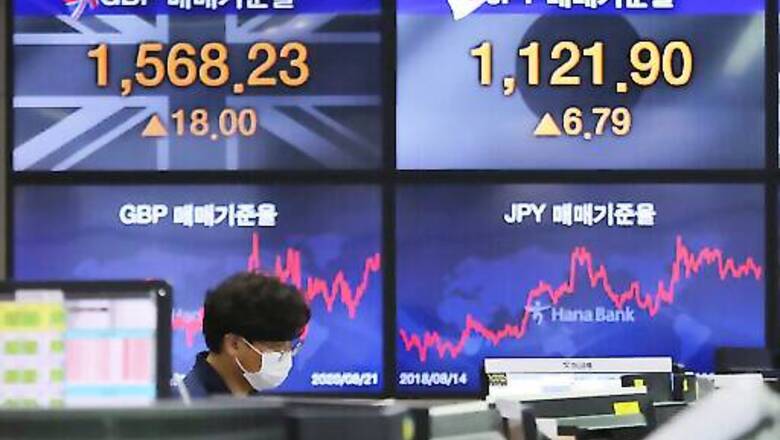
views
NEW YORK: More gains for tech stocks are propping up an otherwise wobbly Wall Street on Friday, as a record-breaking but wishy-washy week of trading comes to a close.
The S&P 500 was up 0.1% in afternoon trading, even though most stocks in the index were weaker, after a couple reports on the U.S. economy showed more strength than economists expected. It followed up on losses across Europe after more discouraging reports there indicated a slowdown in its economies, while Asian stocks climbed and Treasury yields held relatively steady.
The Dow Jones Industrial Average was up 133 points, or 0.5%, at 27,873, as of 1:55 p.m. Eastern time, and the Nasdaq composite was 0.1% higher.
The S&P 500 returned to a record high this week, wiping out the last of its historic losses from the coronavirus pandemic, but moves in the market have nevertheless been very muted. The index is on pace for a 0.5% gain for the week, as momentum has slowed recently after it roared back from its nearly 34% plunge from late February into March. At 3,389.93, it’s a touch above its record closing level of 3,389.78 set on Tuesday.
Investors are still waiting for more clarity on several fronts, which could drive the next big move up or down.
The economy has shown some signs of stalling recently, with Fridays reports from Europe the latest reminder that a steady rise in coronavirus cases may be undermining growth. They follow a U.S. report from Thursday that showed that the number of workers applying for unemployment benefits picked up again last week.
But the picture remains mixed. A separate report from IHS Markit on Friday said preliminary data suggests output from the U.S. private sector is at an 18-month high. Sales of previously occupied homes were also stronger in July than economists expected, as activity exploded in every region of the country.
Those reports helped the U.S. stock market recover from declines earlier in the morning.
Big gains for tech stocks were once again the biggest factor keeping the market steady. Most stocks were falling on Wall Street, and the smaller companies in the Russell 2000 small-cap index were down 0.9%.
Even within the S&P 500 index of big companies, roughly 60% of the stocks were lower, with energy producers and financial stocks dropping. But tech stocks in the S&P 500 were up 0.8% to help offset all of that.
Tech has remained remarkably resilient through the pandemic and continued to churn out big profits as work-from-home and other tech-friendly trends accelerate. Apple, which this week became the first U.S. company to have a market value of more than $2 trillion, rose 3.7%.
Deere was another big winner after it reported profit for the latest quarter that was double what Wall Street expected. Its shares rose 5.5%.
The Federal Reserve is continuing to prop up markets and the economy by keeping interest rates at nearly zero and buying reams of bonds. But stimulus from Congress has lapsed, and Democrats and Republicans on Capitol Hill continue to haggle.
Investors say the economy and markets need another round of big support from Congress for the recovery to continue.
Ultimately, it will take some combination of bad data, bad markets and good politics to break the impasse, economist Ethan Harris wrote in a BofA Global Research report. Meanwhile, every passing week without meaningful legislation lengthens the mini-recession. This is not the kind of August break this economy needs.
Beyond Capitol Hill, investors are also waiting for the latest developments in the rising tensions between the world’s two largest economies.
Chinas Commerce Ministry on Thursday said that Chinese and U.S. trade envoys will hold a meeting by phone in the near future to discuss an agreement aimed at resolving their tariff war. No details on timing were given.
The yield on the 10-year Treasury held steady at 0.64%.
In European stock markets, Germany’s DAX slipped 0.5%. Frances CAC 40 fell 0.3%, while the FTSE 100 in London lost 0.2%.
Earlier, Asian markets closed higher. Japan’s Nikkei 225 gained 0.2%, South Koreas Kospi rose 1.3% and Hong Kongs Hang Seng added 1.3%.
Benchmark U.S. crude oil fell 1.8% to $42.04 per barrel. Brent crude, the international standard, lost 1.9% to $44.05 per barrel.
___
AP Business Writer Yuri Kageyama contributed.
Disclaimer: This post has been auto-published from an agency feed without any modifications to the text and has not been reviewed by an editor

















Comments
0 comment